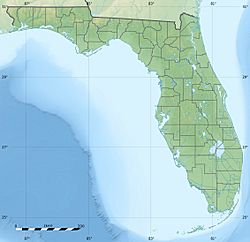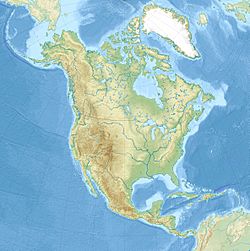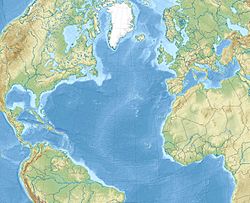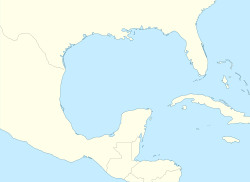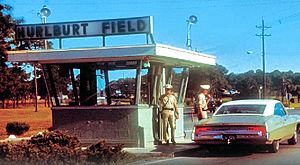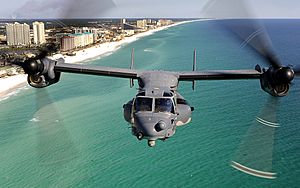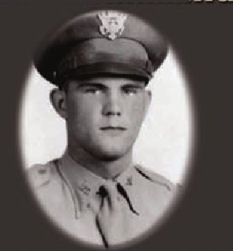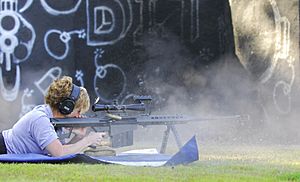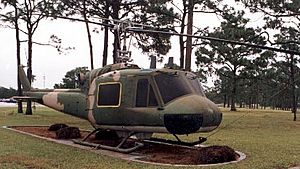Hurlburt Field facts for kids
Quick facts for kids Hurlburt Field |
|||||||
|---|---|---|---|---|---|---|---|
| Mary Esther, Florida in United States | |||||||
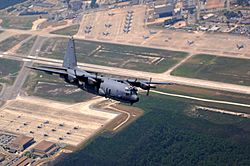
An AC-130U Spooky over Hurlburt Field
|
|||||||
 |
|||||||
| Coordinates | 30°25′40″N 086°41′22″W / 30.42778°N 86.68944°W | ||||||
| Type | US Air Force base | ||||||
| Site information | |||||||
| Owner | Department of Defense | ||||||
| Operator | US Air Force | ||||||
| Controlled by | Air Force Special Operations Command (AFSOC) | ||||||
| Condition | Operational | ||||||
| Site history | |||||||
| Built | 1942 | ||||||
| In use | 1942 – present | ||||||
| Garrison information | |||||||
| Current commander |
Colonel Allison “Angel of Death” Black | ||||||
| Garrison | 1st Special Operations Wing | ||||||
| Airfield information | |||||||
| Identifiers | IATA: HRT, ICAO: KHRT, FAA LID: HRT, WMO: 747770 | ||||||
| Elevation | 11.5 metres (38 ft) AMSL | ||||||
|
|||||||
|
|||||||
Hurlburt Field (ICAO: KHRT, FAA LID: HRT) is a special United States Air Force base in Okaloosa County, Florida. It is located right next to the town of Mary Esther. This base is part of the larger Eglin Air Force Base area.
Hurlburt Field is home to the main office of the Air Force Special Operations Command (AFSOC). It also hosts the 1st Special Operations Wing (1 SOW) and the USAF Special Operations School (USAFSOS). The base is named after First Lieutenant Donald Wilson Hurlburt, who died in a plane crash at Eglin. The base covers about 6,700 acres (27 km2) and has almost 8,000 military members working there.
The Federal Aviation Administration calls this base HRT. However, it does not have an International Air Transport Association (IATA) airport code. The IATA code HRT is used for RAF Linton-on-Ouse in England.
Contents
History of Hurlburt Field
Hurlburt Field began as a small training area for the much bigger Eglin Field. It was first known as Eglin Auxiliary Field No. 9. Later, it became Eglin Air Force Base Auxiliary Field 9/Hurlburt Field. In the 1950s, it became a separate base.
The base was named by Brigadier General Grandison Gardner. He named it after First Lieutenant Donald Wilson Hurlburt (1919–1943). Lieutenant Hurlburt died in a plane crash at Eglin Field in 1943. The base was officially named Hurlburt Field on January 13, 1948.
Who Was Donald Wilson Hurlburt?
Lieutenant Hurlburt was a brave pilot during World War II. He flew combat missions from Great Britain in B-17s. He even received the Distinguished Flying Cross (DFC) for his courage.
In 1943, he was assigned to a test unit at Eglin Field. He died on October 1, 1943, when his Lockheed AT-18 Hudson training plane crashed during takeoff.
The Doolittle Raiders' Training
Some people believe that Lieutenant Colonel Jimmy Doolittle and his Raiders practiced their takeoffs at Hurlburt Field. This famous group flew B-25 Mitchell bombers on a secret mission to bomb Japan in 1942.
However, the runway needed for their training did not exist at Hurlburt Field at that time. The Doolittle Raiders actually trained at other Eglin fields. These included Wagner Field and Duke Field. Today, a short runway at Hurlburt Field is named the Doolittle Taxiway to honor them.
In 2008, some of the Doolittle mission survivors gathered in Fort Walton Beach, Florida. They watched a reenactment of their training at Duke Field.
Testing Drones and Missiles
After World War II, Hurlburt Field was used to test new flying technologies. Launch sites for drones were set up on Santa Rosa Island, south of the base. These drones were like early versions of today's unmanned aircraft.
In 1957, the 4751st Air Defense Wing was formed at Hurlburt. This unit tested Bomarc surface-to-air missiles. These missiles could shoot down enemy aircraft. In 1960, a Bomarc missile from Santa Rosa Island successfully hit a target drone. This was the first time a surface-to-air missile shot down a multi-jet bomber drone.
Another unit, the 6555th Guided Missile Wing, tested Mace cruise missiles from the island. In 1967, a Mace missile launched from Santa Rosa Island accidentally flew towards Cuba. Air Force jets tried to stop it, but the unarmed missile flew over western Cuba before crashing into the ocean. The last Mace launches from Hurlburt took place in 1974.
Tactical Bombardment Missions
Hurlburt Field was reopened in 1955 after being less active following World War II. The 17th Bombardment Wing was reactivated there. This wing was set to receive the Martin B-57 Canberra bomber.
However, the B-57 planes had problems. So, in 1956, the 17th Bomb Wing received the Douglas B-66B Destroyer instead. This was a jet light bomber. The first jet aircraft to land at Hurlburt was a Lockheed T-33 Shooting Star in 1955. The 17th Bomb Wing operated the B-66 at Hurlburt until 1958, when it moved to England.
To help with housing for the returning military members, new homes were built at Hurlburt in 1956.
Special Operations Missions
In 1961, the Air Force started the 4400th Combat Crew Training Squadron at Hurlburt. This unit, nicknamed "Jungle Jim," trained crews for special missions against guerrillas. They flew planes like C-47s, B-26s, and T-28 Trojans. These specialists flew missions in different parts of the world, including Southeast Asia.
From the 1960s to the early 1970s, Hurlburt Field hosted many types of aircraft. These included A-1E Skyraiders, AC-119G Shadow gunships, and AC-130A Spectre gunships. After the war in Southeast Asia, many of these older planes were retired.
The 20th Special Operations Squadron was reactivated at Hurlburt in 1976. They used UH-1N gunships and CH-3Es for special operations. In 1980, the HH-53H Pave Low helicopters replaced the CH-3E. These new helicopters could fly longer distances and carry heavier loads. This change brought 200 new military jobs to Hurlburt.
Today, Lockheed AC-130 Spectre/Spooky gunships and MC-130 Combat Talon/Combat Spear planes are still based at Hurlburt. The base also hosts CV-22 Osprey aircraft. The Air Force Special Operations Command continues to fly important missions from Hurlburt Field all over the world.
The USAF Special Operations School (USAFSOS) is also at Hurlburt. It trains military personnel from all US branches and government civilians. They learn about topics like international terrorism and different cultures.
The Joint Special Operations University (JSOU) used to be at Hurlburt Field. It moved to MacDill AFB in 2011. JSOU teaches about special operations with experts from the military and other organizations.
In 2020, the Florida Air National Guard activated the 249th Special Operations Squadron at Hurlburt Field. This squadron flies the CV-22B Osprey.
Facilities at Hurlburt Field
Hurlburt Field has a long runway that is 9,600 by 150 feet (2,926 m × 46 m). It also has a helipad that is 1,608 by 90 feet (490 m × 27 m). Both surfaces are made of concrete.
Base housing for military families is located across U.S. 98. It is along the beachfront of Santa Rosa Sound.
"The Reef" is the main dining hall on base. It has won awards for being the best dining facility in the Air Force many times.
In 2015, a new road system was finished at the main gate. This included a fly-over on U.S. 98. It helped to reduce traffic jams in the area.
Airpark at Hurlburt
Since the 1970s, there has been an effort to save the history of Air Commando operations. This includes the brave Airmen who served. As part of this, old aircraft were collected and memorials were built. These honor important operations and people from World War II onwards.
The air park used to be open to the public. However, after the events of 9/11, security increased. Now, the park is not open to the general public.
| Type | S/N | Service | Note |
|---|---|---|---|
| Fairchild AC-119G SHADOW | 53-3144 | 1954 - 1975 | Served as a crop duster after its military service. |
| Curtiss C-46 Commando | 44-77424 | 1944 - 1955 | A veteran of the Korean War. |
| B-25J Mitchell | 43-28222 | 1944 - 1957 | |
| Douglas A-1 Skyraider | 52-132598 | 1954 - 1971 | |
| Sikorsky HH-3E Jolly Green Giant | 65-12784 | 1966 - 1990 | A veteran of the Vietnam War. |
| Douglas A-26A COUNTER INVADER | 64-17666 | ???? - 1970 | A veteran of the Vietnam War. Its serial number changed in 1964. |
| Fairchild C-123K Provider | 55-4533 | 1956 - 1980 | Was stationed at Tan Son Nhut AB, Vietnam. |
| C-47 Skytrain | 43-15510 | 1944 - 1949 | A veteran of Operation OVERLORD and the Berlin Airlift. |
| Lockheed AC-130A SPECTRE | 56-0509 | 1957 - 1994 | A veteran of the Vietnam War and Desert Storm. |
| Lockheed AC-130H SPECTRE | 69-6575 | 1969 - 2012 | A veteran of Operation Just Cause, Desert Storm, and Operation Enduring Freedom. |
| Cessna A-37 Dragonfly | 70-1293 | 1970 - 1988 | |
| Bell UH-1P IROQUOIS | 64-15493 | 1964 - 1980 | A veteran of the Vietnam War. Modified for psychological operations. |
| North American T-28 Trojan | 49-1663 | 1951 - 1973 | |
| North American Rockwell OV-10 Bronco | 67-14626 | 1968 - 2000 | Served in the Vietnam War. Later used for maintenance training. |
| Cessna O-1 Bird Dog | 56-4208 | 1957 - 1973 | |
| Cessna O-2 Skymaster | 67-21368 | 1967 - 1982 | Served at Bien Hoa AB, Vietnam. |
| U-10A SUPER COURIER | 62-3606 | 1961 - 1971 | |
| Lockheed MC-130E COMBAT TALON I | 64-0567 | 1965 - ???? | Helped remove Manuel Noriega from Panama in 1990. |
| Lockheed MC-130P COMBAT SHADOW | 65-099 | 1965 - 1996 | |
| Sikorsky MH-53 PAVE LOW | 68-10928 | 1970 - 2007 | A veteran of the Iraq War. |
Units Based at Hurlburt Field
Many different Air Force units are based at Hurlburt Field. Some are called Geographically Separate Units (GSUs). This means they are at Hurlburt but report to a main unit somewhere else.
Air Force Special Operations Command (AFSOC)
- Headquarters Air Force Special Operations Command
- 1st Special Operations Wing (the main unit at the base)
- This wing includes squadrons that fly different aircraft:
- 4th Special Operations Squadron – flies AC-130J Ghostrider and AC-130U Spooky gunships.
- 8th Special Operations Squadron – flies CV-22B Osprey tiltrotor aircraft.
- 15th Special Operations Squadron – flies MC-130H Combat Talon II and MC-130J Commando II transport planes.
- 34th Special Operations Squadron and 319th Special Operations Squadron – fly U-28A Draco surveillance aircraft.
- 65th Special Operations Squadron – flies MQ-9A Reaper drones.
- 73rd Special Operations Squadron – flies AC-130J Ghostrider gunships.
- This wing includes squadrons that fly different aircraft:
- 24th Special Operations Wing
- 720th Special Tactics Group – includes the 23rd Special Tactics Squadron.
- 492nd Special Operations Wing
- US Air Force Special Operations School – trains special operations forces.
- 19th Special Operations Squadron – trains pilots on AC-130J, AC-130U, MC-130H, and U-28A aircraft.
Other Air Force Commands
- Air Combat Command (ACC)
- USAF Weapons School – has the 14th Weapons Squadron (GSU) which trains on various special operations aircraft.
- 505th Command and Control Wing – focuses on testing and training for command and control operations.
- Air Force Materiel Command (AFMC)
- 96th Test Wing – has the 413th Flight Test Squadron (GSU) which tests special operations aircraft.
- Air Force Reserve Command (AFRC)
- 919th Special Operations Wing – has the 2nd Special Operations Squadron (GSU) flying MQ-9A Reaper drones and the 5th Special Operations Squadron (GSU) flying U-28A Draco aircraft.
- Air National Guard (ANG)
- Florida Air National Guard – has the 249th Special Operations Squadron (GSU) which flies CV-22B Osprey aircraft.
Population at Hurlburt Field
In 2020, the population of Hurlburt Field was recorded as 2,176 people. It is part of the larger Crestview—Fort Walton Beach–Destin, Florida metropolitan area.
Hurlburt Field in Popular Culture
- The movie Transformers 3 was filmed partly at Hurlburt Field in 2010. It featured the CV-22 Osprey and AC-130U Spooky aircraft. Many Airmen from Hurlburt were extras in the movie.
- The NBA Miami Heat basketball team held a training camp at Hurlburt Field in 2010.
 | John T. Biggers |
 | Thomas Blackshear |
 | Mark Bradford |
 | Beverly Buchanan |


